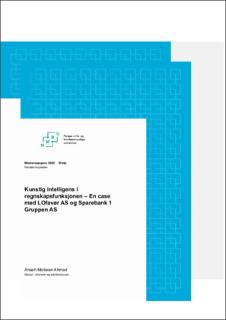| dc.contributor.advisor | Aune, Stig Aleksander | |
| dc.contributor.author | Ahmad, Ansah Mobeen | |
| dc.coverage.spatial | Norway | en_US |
| dc.date.accessioned | 2021-01-20T19:51:15Z | |
| dc.date.available | 2021-01-20T19:51:15Z | |
| dc.date.issued | 2020 | |
| dc.identifier.uri | https://hdl.handle.net/11250/2724007 | |
| dc.description.abstract | Bakgrunn: Den digitale revolusjonen har ført til at regnskapsfunksjonen er i endring. Flere forskningsrapporter viser at implementering av kunstig intelligens vil ha stor innvirkning på regnskapsfunksjonens arbeidsoppgaver (PwC, 2015). Mange selskaper ser derfor potensialet og mulighetene teknologien kan gi. Til tross for at kunstig intelligens gir store muligheter, er det beheftet utfordringer rundt bruk av teknologien.
Hensikt: Studien har til hensikt å undersøke muligheter og utfordringer ved bruk av kunstig intelligens i regnskapsfunksjonen. På bakgrunn av dette valgte jeg følgende problemstilling: ”Hvilke muligheter og utfordringer finnes ved bruk av kunstig intelligens for å håndtere inngående og utgående fakturaer? – En case med LOfavør AS og Sparebank 1 Gruppen AS”
Metode: For å besvare denne problemstillingen ble det utført en kvalitativ studie med LOfavør AS og Sparebank 1 Gruppen AS som casebedrifter. Det ble benyttet semi-strukturert intervju som instrument for innsamling av data. Utvalget bestod av totalt syv ansatte i aldergruppen 50-65 år basert på forhåndsbestemt utvalgsstrategi.
Resultater: Studien viser at de største mulighetene kunstig intelligens kan gi er automatisering, effektivitet, etterfulgt av kostnadsbesparelse og økt verdiskapning. Det kommer også frem at kunstig intelligens kan gi redusert risiko for feil, økt kvalitet, raskere rapportering, samt mindre arbeidsbelastning. Samtidig trekker studien frem at de mest sentrale utfordringene er tillit, mangel på kompetanse og at det er kostnadskrevende å implementere et nytt verktøy.
Konklusjon: Det er beheftet en rekke muligheter og utfordringer rundt bruk av kunstig intelligens i regnskapsfunksjonen. Jeg håper derfor at denne studien kan bli et viktig bidrag for virksomheter som vurderer å ta i bruk kunstig intelligens i regnskapsfunksjonen. Ved å være bevisst på muligheter og utfordringer kan selskaper lykkes med implementering av kunstig intelligens og utvikle en moderne regnskapsfunksjon. | en_US |
| dc.description.abstract | Background: The digital revolution has led to that the accounting function is changing. Several research reports show that the implementation of artificial intelligence will have a major impact on the accounting functions (PwC, 2015). Therefore, many companies see the potential and possibilities that technology can provide. Despite the fact that artificial intelligence offers great opportunities, there are challenges facing the use of technology.
Purpose: The study intends to explore the possibilities and challenges of using artificial intelligence in the accounting function. Based on this, I chose the following problem: ”What possibilities and challenges exist when using artificial intelligence to handle incoming and outgoing invoices? – A case with LOfavør AS and Sparebank 1 Gruppen AS”
Method: To answer this problem, a qualitative study was conducted with LOfavør AS and Sparebank 1 Gruppen AS as case companies. A semi-structured interview was used as an instrument for data collection. The sample consisted of a total of seven employees in the age group 50-65 years based on a predetermined selection strategy.
Results: The study shows that the benefits and possibilities artificial intelligence can provide are automation, efficiency, followed by cost savings and increased value creation. It also emerges that artificial intelligence can reduce the risk of errors, increased quality, faster reporting, and less workload. At the same time, the study highlights that the most important challenges are trust, lack of expertise ant that it is costly to implement a new tool.
Conclusion: A number of opportunities and challenges have been identified regarding the use of artificial intelligence in the accounting function. I hope, therefore, that this study can be an important contribution for companies considering the use of artificial intelligence in the accounting function. By being aware of opportunities and challenges, companies can succeed in implementing artificial intelligence and develop a modern accounting function. | en_US |
| dc.language.iso | nob | en_US |
| dc.publisher | Norwegian University of Life Sciences, Ås | en_US |
| dc.rights | Attribution-NonCommercial-NoDerivatives 4.0 Internasjonal | * |
| dc.rights.uri | http://creativecommons.org/licenses/by-nc-nd/4.0/deed.no | * |
| dc.title | Kunstig intelligens i regnskapsfunksjonen : en case med LOfavør AS og Sparebank 1 Gruppen AS | en_US |
| dc.type | Master thesis | en_US |
| dc.description.localcode | M-ØA | en_US |

